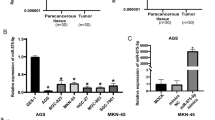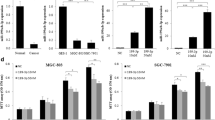Abstract
Gastric cancer (GC) is the second leading cause of cancer-related mortality worldwide. MicroRNAs (miRNAs) have been extensively reported to play a role in GC development; however, it remains unknown whether miR-153-3p participates in the nosogenesis of GC. GC tissues along with the adjacent nontumor tissues were obtained from 50 patients with GC. Moreover, we incubated human GC cell lines (SGC7901, AGS, MGC803, and BGC823) and a gastric epithelial cell line (GES-1) and then transfected BGC823 cells with miR-153-3p and DNA/SphK2 vector to determine the action of miR-153-3p and SphK2 on GC. RT-qPCR was performed to determine the levels of miR-153-3p and sphingosine kinase 2 (SphK2). The viability of BGC823 cells was measured by the CCK-8 assay, while wound healing assays and transwell assays were used to measure the migration and invasion ability of BGC823 cells. Western blotting analysis and immunohistochemistry (IHC) were conducted to evaluate the level of SphK2. The binding ability of miR-153-3p and SphK2 was determined by dual-luciferase reporter assays. The expression level of miR-153-3p was reduced in GC tissues and cells, while the SphK2 was enhanced. An increase in miR-153-3p level led to a decline in the growth and metastasis of GC cells and increased their apoptosis. Moreover, a decrease in miR-153-3p level elevated GC cells growth and metastasis, and attenuated their apoptosis. SphK2 was also corroborated as a downstream gene of miR-153-3p. Here, SphK2 expression was elevated in GC tissues and cells, indicating SphK2 might be involved in the development of GC. Rescue assays showed that miR-153-3p could reverse the effect of SphK2 on the cell growth, metastasis, and the apoptosis of GC cells. In conclusion, this study showed that miR-153-3p suppressed the growth and metastasis in GC cells by regulating SphK2, which might facilitate the search for novel biomarkers to treat GC.






Similar content being viewed by others
Data Availability
The data used to support the findings of this study are available from the corresponding author upon request.
Code Availability
Not applicable.
References
Bray F, Ferlay J, Soerjomataram I, Siegel RL, Torre LA, Jemal A (2018) Global cancer statistics 2018: GLOBOCAN estimates of incidence and mortality worldwide for 36 cancers in 185 countries. CA Cancer J Clin 68(6):394–424. https://doi.org/10.3322/caac.21492
Chandra R, Balachandar N, Wang S, Reznik S, Zeh H, Porembka M (2021) The changing face of gastric cancer: epidemiologic trends and advances in novel therapies. Cancer Gene Ther 28(5):390–399. https://doi.org/10.1038/s41417-020-00234-z
Feng Q, Wu X, Li F et al (2017) miR-27b inhibits gastric cancer metastasis by targeting NR2F2. Protein Cell 8(2):114–122. https://doi.org/10.1007/s13238-016-0340-z
Fitzmaurice C, Akinyemiju TF, Global Burden of Disease Cancer C et al (2018) Global, regional, and national cancer incidence, mortality, years of life lost, years lived with disability, and disability-adjusted life-years for 29 cancer groups, 1990 to 2016: a systematic analysis for the global burden of disease study. JAMA Oncol 4(11):1553–1568. https://doi.org/10.1001/jamaoncol.2018.2706
Hasanifard L, Sheervalilou R, Majidinia M, Yousefi B (2019) New insights into the roles and regulation of SphK2 as a therapeutic target in cancer chemoresistance. J Cell Physiol 234(6):8162–8181. https://doi.org/10.1002/jcp.27612
He Y, Ge Y, Jiang M et al (2018) MiR-592 promotes gastric cancer proliferation, migration, and invasion through the PI3K/AKT and MAPK/ERK signaling pathways by targeting Spry2. Cell Physiol Biochem 47(4):1465–1481. https://doi.org/10.1159/000490839
Hu S, Zheng Q, Wu H, Wang C, Liu T, Zhou W (2017) miR-532 promoted gastric cancer migration and invasion by targeting NKD1. Life Sci 177:15–19. https://doi.org/10.1016/j.lfs.2017.03.019
Jiang J, Liu Y, Zhao Y, Tian F, Wang G (2019) miR-153-3p suppresses inhibitor of growth protein 2 expression to function as tumor suppressor in acute lymphoblastic leukemia. Technol Cancer Res Treat 18:1533033819852990. https://doi.org/10.1177/1533033819852990
Jiang M, Shi L, Yang C et al (2019) miR-1254 inhibits cell proliferation, migration, and invasion by down-regulating Smurf1 in gastric cancer. Cell Death Dis 10(1):32. https://doi.org/10.1038/s41419-018-1262-x
Joo LJS, Weiss J, Gill AJ et al (2019) RET kinase-regulated microRNA-153-3p improves therapeutic efficacy in medullary thyroid carcinoma. Thyroid 29(6):830–844. https://doi.org/10.1089/thy.2018.0525
Li Y, Qin C (2019) MiR-1179 inhibits the proliferation of gastric cancer cells by targeting HMGB1. Hum Cell 32(3):352–359. https://doi.org/10.1007/s13577-019-00244-6
Li C, Zhang Y, Zhao W, Cui S, Song Y (2019) miR-153-3p regulates progression of ovarian carcinoma in vitro and in vivo by targeting MCL1 gene. J Cell Biochem 120(11):19147–19158. https://doi.org/10.1002/jcb.29244
Liu XH, Sun M, Nie FQ et al (2014) Lnc RNA HOTAIR functions as a competing endogenous RNA to regulate HER2 expression by sponging miR-331–3p in gastric cancer. Mol Cancer 13:92. https://doi.org/10.1186/1476-4598-13-92
Luan W, Shi Y, Zhou Z, Xia Y, Wang J (2018) circRNA_0084043 promote malignant melanoma progression via miR-153-3p/Snail axis. Biochem Biophys Res Commun 502(1):22–29. https://doi.org/10.1016/j.bbrc.2018.05.114
Pellino A, Riello E, Nappo F et al (2019) Targeted therapies in metastatic gastric cancer: current knowledge and future perspectives. World J Gastroenterol 25(38):5773–5788. https://doi.org/10.3748/wjg.v25.i38.5773
Rupaimoole R, Slack FJ (2017) MicroRNA therapeutics: towards a new era for the management of cancer and other diseases. Nat Rev Drug Discov 16(3):203–222. https://doi.org/10.1038/nrd.2016.246
Shi W, Zhang S, Ma D et al (2020) Targeting SphK2 reverses acquired resistance of regorafenib in hepatocellular carcinoma. Front Oncol 10:694. https://doi.org/10.3389/fonc.2020.00694
Song SZ, Lin S, Liu JN et al (2019) Targeting of SPP1 by microRNA-340 inhibits gastric cancer cell epithelial-mesenchymal transition through inhibition of the PI3K/AKT signaling pathway. J Cell Physiol 234(10):18587–18601. https://doi.org/10.1002/jcp.28497
Song K, Dai L, Long X, Wang W, Di W (2020) Follicle-stimulating hormone promotes the proliferation of epithelial ovarian cancer cells by activating sphingosine kinase. Sci Rep 10(1):13834. https://doi.org/10.1038/s41598-020-70896-0
Thrift AP, El-Serag HB (2020) Burden of gastric cancer. Clin Gastroenterol Hepatol 18(3):534–542. https://doi.org/10.1016/j.cgh.2019.07.045
Xu D, Zhu H, Wang C et al (2017) SphK2 over-expression promotes osteosarcoma cell growth. Oncotarget 8(62):105525–105535. https://doi.org/10.18632/oncotarget.22314
Yao Q, Chen Y, Zhou X (2019) The roles of microRNAs in epigenetic regulation. Curr Opin Chem Biol 51:11–17. https://doi.org/10.1016/j.cbpa.2019.01.024
Zhang X, Zhang P, Shao M et al (2018) SALL4 activates TGF-beta/SMAD signaling pathway to induce EMT and promote gastric cancer metastasis. Cancer Manag Res 10:4459–4470. https://doi.org/10.2147/CMAR.S177373
Zhang F, Li K, Yao X et al (2019) A miR-567-PIK3AP1-PI3K/AKT-c-Myc feedback loop regulates tumour growth and chemoresistance in gastric cancer. EBioMedicine 44:311–321. https://doi.org/10.1016/j.ebiom.2019.05.003
Zhang YH, Shi WN, Wu SH et al (2020) SphK2 confers 5-fluorouracil resistance to colorectal cancer via upregulating H3K56ac-mediated DPD expression. Oncogene 39(29):5214–5227. https://doi.org/10.1038/s41388-020-1352-y
Zhou QY, Peng PL, Xu YH (2019) MiR-221 affects proliferation and apoptosis of gastric cancer cells through targeting SOCS3. Eur Rev Med Pharmacol Sci 23(21):9427–9435. https://doi.org/10.26355/eurrev_201911_19436
Zuo J, Zhao M, Fan Z et al (2020) MicroRNA-153-3p regulates cell proliferation and cisplatin resistance via Nrf-2 in esophageal squamous cell carcinoma. Thorac Cancer 11(3):738–747. https://doi.org/10.1111/1759-7714.13326
Acknowledgements
Not applicable.
Funding
This research did not receive any specific grant from funding agencies in the public, commercial, or not-for-profit sectors.
Author information
Authors and Affiliations
Corresponding author
Ethics declarations
Conflict of interest
The authors declare that there is no conflict of interest.
Ethical Approval
The study was approved by ethics committee regulations of Tongxiang First People’s Hospital.
Consent to Participate
The study was performed under the informed consent of the patients.
Consent for Publication
Not applicable.
Additional information
Publisher's Note
Springer Nature remains neutral with regard to jurisdictional claims in published maps and institutional affiliations.
Rights and permissions
About this article
Cite this article
Jia, Z., Tang, X., Zhang, X. et al. miR-153-3p Attenuates the Development of Gastric Cancer by Suppressing SphK2. Biochem Genet 60, 1748–1761 (2022). https://doi.org/10.1007/s10528-021-10166-4
Received:
Accepted:
Published:
Issue Date:
DOI: https://doi.org/10.1007/s10528-021-10166-4




